The Impact of Transformational Leadership on Social Enterprises
VerifiedAdded on 2023/01/19
|7
|1818
|83
Report
AI Summary
This report delves into the realm of international leadership, focusing on the application of transformational leadership within social enterprises. It begins by defining social enterprise and its core objectives, emphasizing the connection between these organizations and the non-profit, public, and voluntary sectors. The report explores the diverse structures, missions, and ethical considerations inherent in social enterprises, highlighting the significance of transformational leadership in achieving sustainability and organizational goals. It examines how transformational leaders inspire followers, foster team work, and motivate intellectual attention to each individual. Furthermore, the report discusses the characteristics of transformational leaders, their influence on followers, and their ability to promote a culture of cohesion and shared goals, which are fundamental to social entrepreneurship. The report also touches on the hurdles present for sustainability and the role of leadership in driving it. It concludes that transformational leadership is highly suitable for social enterprises and effective in motivating people, guiding change, and promoting sustainable development. The report references various academic sources and research findings to support its arguments.

International
leadership
leadership
Paraphrase This Document
Need a fresh take? Get an instant paraphrase of this document with our AI Paraphraser

Table of Contents
INTRODUCTION ..........................................................................................................................1
CONCLUSION ...............................................................................................................................4
INTRODUCTION ..........................................................................................................................1
CONCLUSION ...............................................................................................................................4
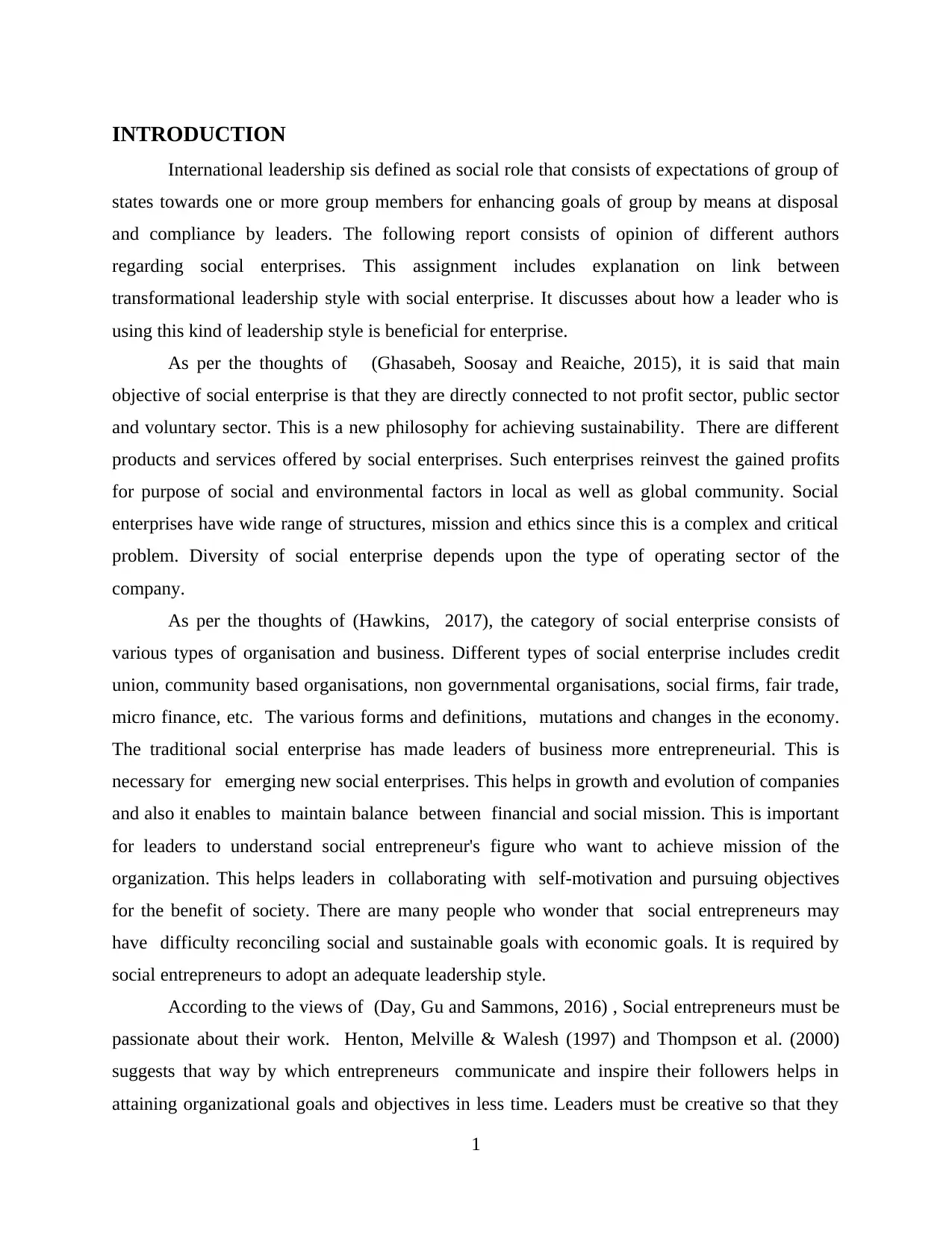
INTRODUCTION
International leadership sis defined as social role that consists of expectations of group of
states towards one or more group members for enhancing goals of group by means at disposal
and compliance by leaders. The following report consists of opinion of different authors
regarding social enterprises. This assignment includes explanation on link between
transformational leadership style with social enterprise. It discusses about how a leader who is
using this kind of leadership style is beneficial for enterprise.
As per the thoughts of (Ghasabeh, Soosay and Reaiche, 2015), it is said that main
objective of social enterprise is that they are directly connected to not profit sector, public sector
and voluntary sector. This is a new philosophy for achieving sustainability. There are different
products and services offered by social enterprises. Such enterprises reinvest the gained profits
for purpose of social and environmental factors in local as well as global community. Social
enterprises have wide range of structures, mission and ethics since this is a complex and critical
problem. Diversity of social enterprise depends upon the type of operating sector of the
company.
As per the thoughts of (Hawkins, 2017), the category of social enterprise consists of
various types of organisation and business. Different types of social enterprise includes credit
union, community based organisations, non governmental organisations, social firms, fair trade,
micro finance, etc. The various forms and definitions, mutations and changes in the economy.
The traditional social enterprise has made leaders of business more entrepreneurial. This is
necessary for emerging new social enterprises. This helps in growth and evolution of companies
and also it enables to maintain balance between financial and social mission. This is important
for leaders to understand social entrepreneur's figure who want to achieve mission of the
organization. This helps leaders in collaborating with self-motivation and pursuing objectives
for the benefit of society. There are many people who wonder that social entrepreneurs may
have difficulty reconciling social and sustainable goals with economic goals. It is required by
social entrepreneurs to adopt an adequate leadership style.
According to the views of (Day, Gu and Sammons, 2016) , Social entrepreneurs must be
passionate about their work. Henton, Melville & Walesh (1997) and Thompson et al. (2000)
suggests that way by which entrepreneurs communicate and inspire their followers helps in
attaining organizational goals and objectives in less time. Leaders must be creative so that they
1
International leadership sis defined as social role that consists of expectations of group of
states towards one or more group members for enhancing goals of group by means at disposal
and compliance by leaders. The following report consists of opinion of different authors
regarding social enterprises. This assignment includes explanation on link between
transformational leadership style with social enterprise. It discusses about how a leader who is
using this kind of leadership style is beneficial for enterprise.
As per the thoughts of (Ghasabeh, Soosay and Reaiche, 2015), it is said that main
objective of social enterprise is that they are directly connected to not profit sector, public sector
and voluntary sector. This is a new philosophy for achieving sustainability. There are different
products and services offered by social enterprises. Such enterprises reinvest the gained profits
for purpose of social and environmental factors in local as well as global community. Social
enterprises have wide range of structures, mission and ethics since this is a complex and critical
problem. Diversity of social enterprise depends upon the type of operating sector of the
company.
As per the thoughts of (Hawkins, 2017), the category of social enterprise consists of
various types of organisation and business. Different types of social enterprise includes credit
union, community based organisations, non governmental organisations, social firms, fair trade,
micro finance, etc. The various forms and definitions, mutations and changes in the economy.
The traditional social enterprise has made leaders of business more entrepreneurial. This is
necessary for emerging new social enterprises. This helps in growth and evolution of companies
and also it enables to maintain balance between financial and social mission. This is important
for leaders to understand social entrepreneur's figure who want to achieve mission of the
organization. This helps leaders in collaborating with self-motivation and pursuing objectives
for the benefit of society. There are many people who wonder that social entrepreneurs may
have difficulty reconciling social and sustainable goals with economic goals. It is required by
social entrepreneurs to adopt an adequate leadership style.
According to the views of (Day, Gu and Sammons, 2016) , Social entrepreneurs must be
passionate about their work. Henton, Melville & Walesh (1997) and Thompson et al. (2000)
suggests that way by which entrepreneurs communicate and inspire their followers helps in
attaining organizational goals and objectives in less time. Leaders must be creative so that they
1
⊘ This is a preview!⊘
Do you want full access?
Subscribe today to unlock all pages.

Trusted by 1+ million students worldwide
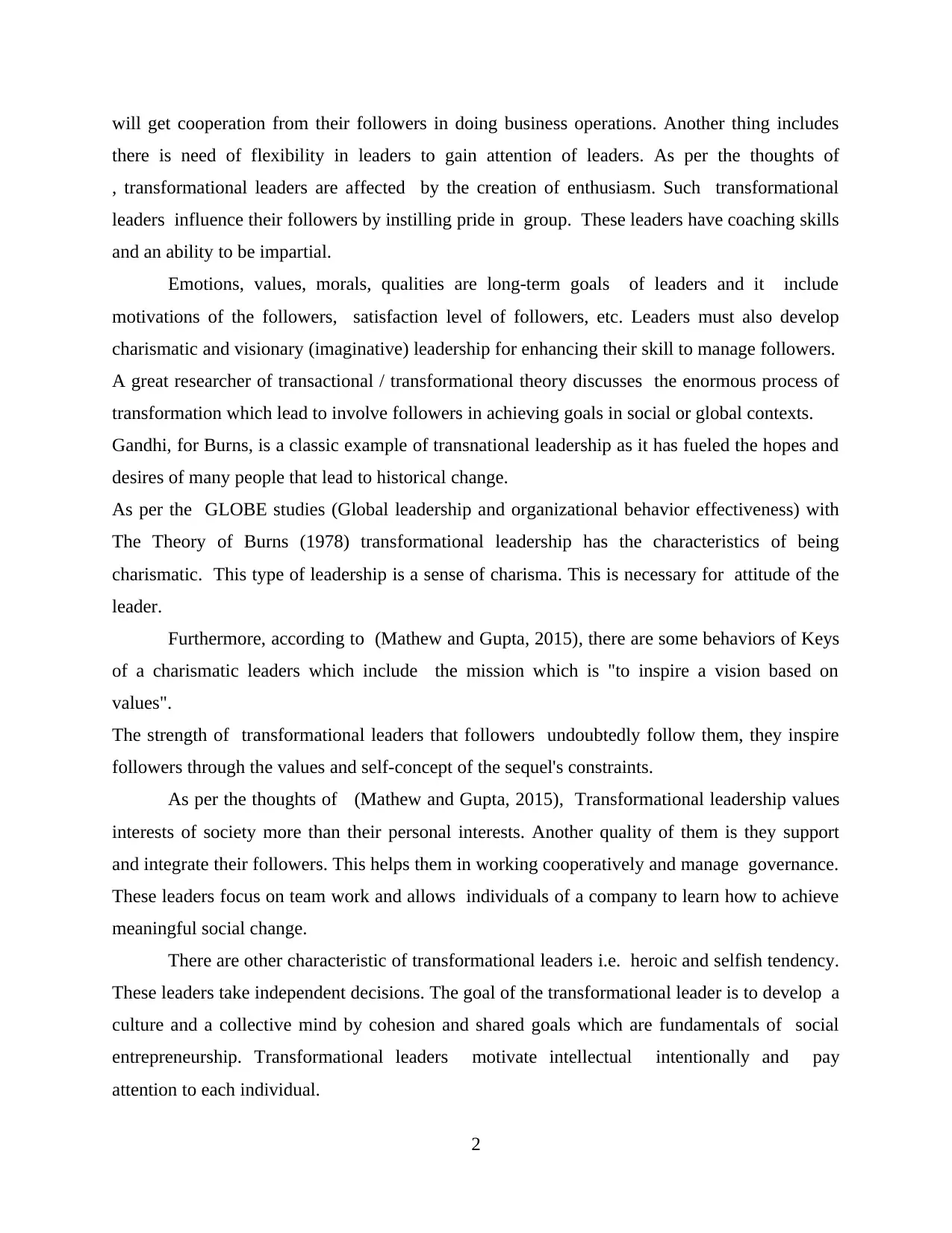
will get cooperation from their followers in doing business operations. Another thing includes
there is need of flexibility in leaders to gain attention of leaders. As per the thoughts of
, transformational leaders are affected by the creation of enthusiasm. Such transformational
leaders influence their followers by instilling pride in group. These leaders have coaching skills
and an ability to be impartial.
Emotions, values, morals, qualities are long-term goals of leaders and it include
motivations of the followers, satisfaction level of followers, etc. Leaders must also develop
charismatic and visionary (imaginative) leadership for enhancing their skill to manage followers.
A great researcher of transactional / transformational theory discusses the enormous process of
transformation which lead to involve followers in achieving goals in social or global contexts.
Gandhi, for Burns, is a classic example of transnational leadership as it has fueled the hopes and
desires of many people that lead to historical change.
As per the GLOBE studies (Global leadership and organizational behavior effectiveness) with
The Theory of Burns (1978) transformational leadership has the characteristics of being
charismatic. This type of leadership is a sense of charisma. This is necessary for attitude of the
leader.
Furthermore, according to (Mathew and Gupta, 2015), there are some behaviors of Keys
of a charismatic leaders which include the mission which is "to inspire a vision based on
values".
The strength of transformational leaders that followers undoubtedly follow them, they inspire
followers through the values and self-concept of the sequel's constraints.
As per the thoughts of (Mathew and Gupta, 2015), Transformational leadership values
interests of society more than their personal interests. Another quality of them is they support
and integrate their followers. This helps them in working cooperatively and manage governance.
These leaders focus on team work and allows individuals of a company to learn how to achieve
meaningful social change.
There are other characteristic of transformational leaders i.e. heroic and selfish tendency.
These leaders take independent decisions. The goal of the transformational leader is to develop a
culture and a collective mind by cohesion and shared goals which are fundamentals of social
entrepreneurship. Transformational leaders motivate intellectual intentionally and pay
attention to each individual.
2
there is need of flexibility in leaders to gain attention of leaders. As per the thoughts of
, transformational leaders are affected by the creation of enthusiasm. Such transformational
leaders influence their followers by instilling pride in group. These leaders have coaching skills
and an ability to be impartial.
Emotions, values, morals, qualities are long-term goals of leaders and it include
motivations of the followers, satisfaction level of followers, etc. Leaders must also develop
charismatic and visionary (imaginative) leadership for enhancing their skill to manage followers.
A great researcher of transactional / transformational theory discusses the enormous process of
transformation which lead to involve followers in achieving goals in social or global contexts.
Gandhi, for Burns, is a classic example of transnational leadership as it has fueled the hopes and
desires of many people that lead to historical change.
As per the GLOBE studies (Global leadership and organizational behavior effectiveness) with
The Theory of Burns (1978) transformational leadership has the characteristics of being
charismatic. This type of leadership is a sense of charisma. This is necessary for attitude of the
leader.
Furthermore, according to (Mathew and Gupta, 2015), there are some behaviors of Keys
of a charismatic leaders which include the mission which is "to inspire a vision based on
values".
The strength of transformational leaders that followers undoubtedly follow them, they inspire
followers through the values and self-concept of the sequel's constraints.
As per the thoughts of (Mathew and Gupta, 2015), Transformational leadership values
interests of society more than their personal interests. Another quality of them is they support
and integrate their followers. This helps them in working cooperatively and manage governance.
These leaders focus on team work and allows individuals of a company to learn how to achieve
meaningful social change.
There are other characteristic of transformational leaders i.e. heroic and selfish tendency.
These leaders take independent decisions. The goal of the transformational leader is to develop a
culture and a collective mind by cohesion and shared goals which are fundamentals of social
entrepreneurship. Transformational leaders motivate intellectual intentionally and pay
attention to each individual.
2
Paraphrase This Document
Need a fresh take? Get an instant paraphrase of this document with our AI Paraphraser
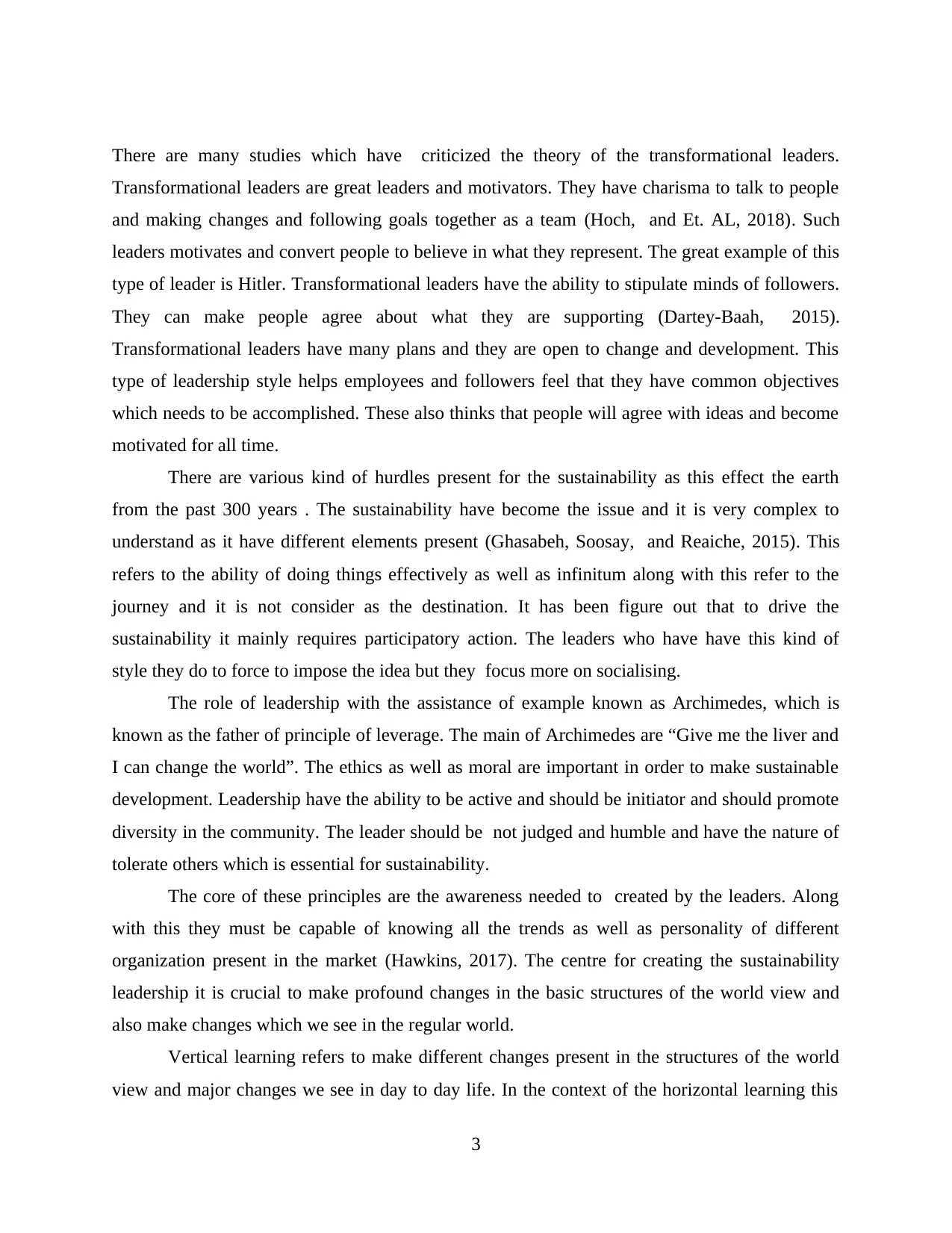
There are many studies which have criticized the theory of the transformational leaders.
Transformational leaders are great leaders and motivators. They have charisma to talk to people
and making changes and following goals together as a team (Hoch, and Et. AL, 2018). Such
leaders motivates and convert people to believe in what they represent. The great example of this
type of leader is Hitler. Transformational leaders have the ability to stipulate minds of followers.
They can make people agree about what they are supporting (Dartey-Baah, 2015).
Transformational leaders have many plans and they are open to change and development. This
type of leadership style helps employees and followers feel that they have common objectives
which needs to be accomplished. These also thinks that people will agree with ideas and become
motivated for all time.
There are various kind of hurdles present for the sustainability as this effect the earth
from the past 300 years . The sustainability have become the issue and it is very complex to
understand as it have different elements present (Ghasabeh, Soosay, and Reaiche, 2015). This
refers to the ability of doing things effectively as well as infinitum along with this refer to the
journey and it is not consider as the destination. It has been figure out that to drive the
sustainability it mainly requires participatory action. The leaders who have have this kind of
style they do to force to impose the idea but they focus more on socialising.
The role of leadership with the assistance of example known as Archimedes, which is
known as the father of principle of leverage. The main of Archimedes are “Give me the liver and
I can change the world”. The ethics as well as moral are important in order to make sustainable
development. Leadership have the ability to be active and should be initiator and should promote
diversity in the community. The leader should be not judged and humble and have the nature of
tolerate others which is essential for sustainability.
The core of these principles are the awareness needed to created by the leaders. Along
with this they must be capable of knowing all the trends as well as personality of different
organization present in the market (Hawkins, 2017). The centre for creating the sustainability
leadership it is crucial to make profound changes in the basic structures of the world view and
also make changes which we see in the regular world.
Vertical learning refers to make different changes present in the structures of the world
view and major changes we see in day to day life. In the context of the horizontal learning this
3
Transformational leaders are great leaders and motivators. They have charisma to talk to people
and making changes and following goals together as a team (Hoch, and Et. AL, 2018). Such
leaders motivates and convert people to believe in what they represent. The great example of this
type of leader is Hitler. Transformational leaders have the ability to stipulate minds of followers.
They can make people agree about what they are supporting (Dartey-Baah, 2015).
Transformational leaders have many plans and they are open to change and development. This
type of leadership style helps employees and followers feel that they have common objectives
which needs to be accomplished. These also thinks that people will agree with ideas and become
motivated for all time.
There are various kind of hurdles present for the sustainability as this effect the earth
from the past 300 years . The sustainability have become the issue and it is very complex to
understand as it have different elements present (Ghasabeh, Soosay, and Reaiche, 2015). This
refers to the ability of doing things effectively as well as infinitum along with this refer to the
journey and it is not consider as the destination. It has been figure out that to drive the
sustainability it mainly requires participatory action. The leaders who have have this kind of
style they do to force to impose the idea but they focus more on socialising.
The role of leadership with the assistance of example known as Archimedes, which is
known as the father of principle of leverage. The main of Archimedes are “Give me the liver and
I can change the world”. The ethics as well as moral are important in order to make sustainable
development. Leadership have the ability to be active and should be initiator and should promote
diversity in the community. The leader should be not judged and humble and have the nature of
tolerate others which is essential for sustainability.
The core of these principles are the awareness needed to created by the leaders. Along
with this they must be capable of knowing all the trends as well as personality of different
organization present in the market (Hawkins, 2017). The centre for creating the sustainability
leadership it is crucial to make profound changes in the basic structures of the world view and
also make changes which we see in the regular world.
Vertical learning refers to make different changes present in the structures of the world
view and major changes we see in day to day life. In the context of the horizontal learning this
3
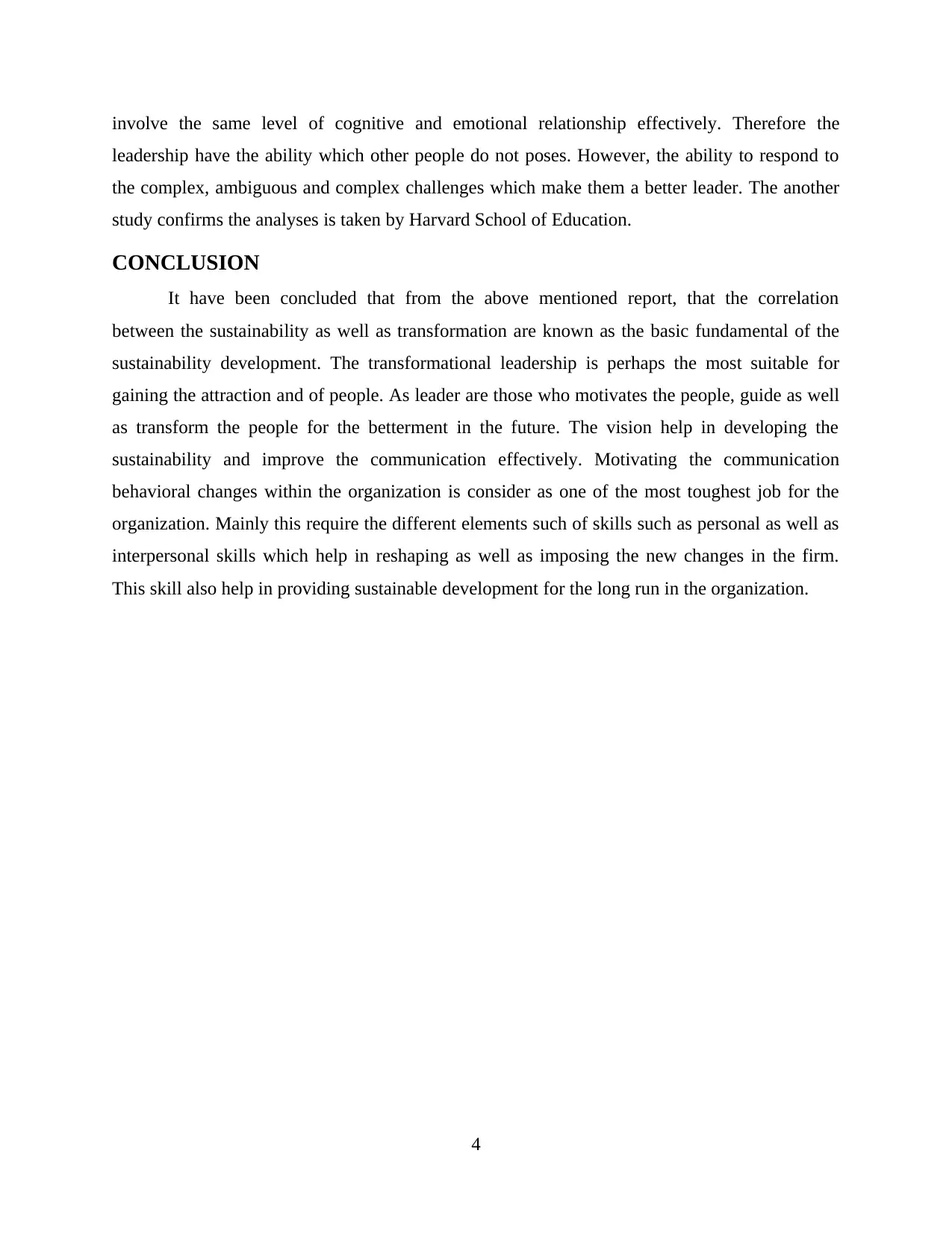
involve the same level of cognitive and emotional relationship effectively. Therefore the
leadership have the ability which other people do not poses. However, the ability to respond to
the complex, ambiguous and complex challenges which make them a better leader. The another
study confirms the analyses is taken by Harvard School of Education.
CONCLUSION
It have been concluded that from the above mentioned report, that the correlation
between the sustainability as well as transformation are known as the basic fundamental of the
sustainability development. The transformational leadership is perhaps the most suitable for
gaining the attraction and of people. As leader are those who motivates the people, guide as well
as transform the people for the betterment in the future. The vision help in developing the
sustainability and improve the communication effectively. Motivating the communication
behavioral changes within the organization is consider as one of the most toughest job for the
organization. Mainly this require the different elements such of skills such as personal as well as
interpersonal skills which help in reshaping as well as imposing the new changes in the firm.
This skill also help in providing sustainable development for the long run in the organization.
4
leadership have the ability which other people do not poses. However, the ability to respond to
the complex, ambiguous and complex challenges which make them a better leader. The another
study confirms the analyses is taken by Harvard School of Education.
CONCLUSION
It have been concluded that from the above mentioned report, that the correlation
between the sustainability as well as transformation are known as the basic fundamental of the
sustainability development. The transformational leadership is perhaps the most suitable for
gaining the attraction and of people. As leader are those who motivates the people, guide as well
as transform the people for the betterment in the future. The vision help in developing the
sustainability and improve the communication effectively. Motivating the communication
behavioral changes within the organization is consider as one of the most toughest job for the
organization. Mainly this require the different elements such of skills such as personal as well as
interpersonal skills which help in reshaping as well as imposing the new changes in the firm.
This skill also help in providing sustainable development for the long run in the organization.
4
⊘ This is a preview!⊘
Do you want full access?
Subscribe today to unlock all pages.

Trusted by 1+ million students worldwide
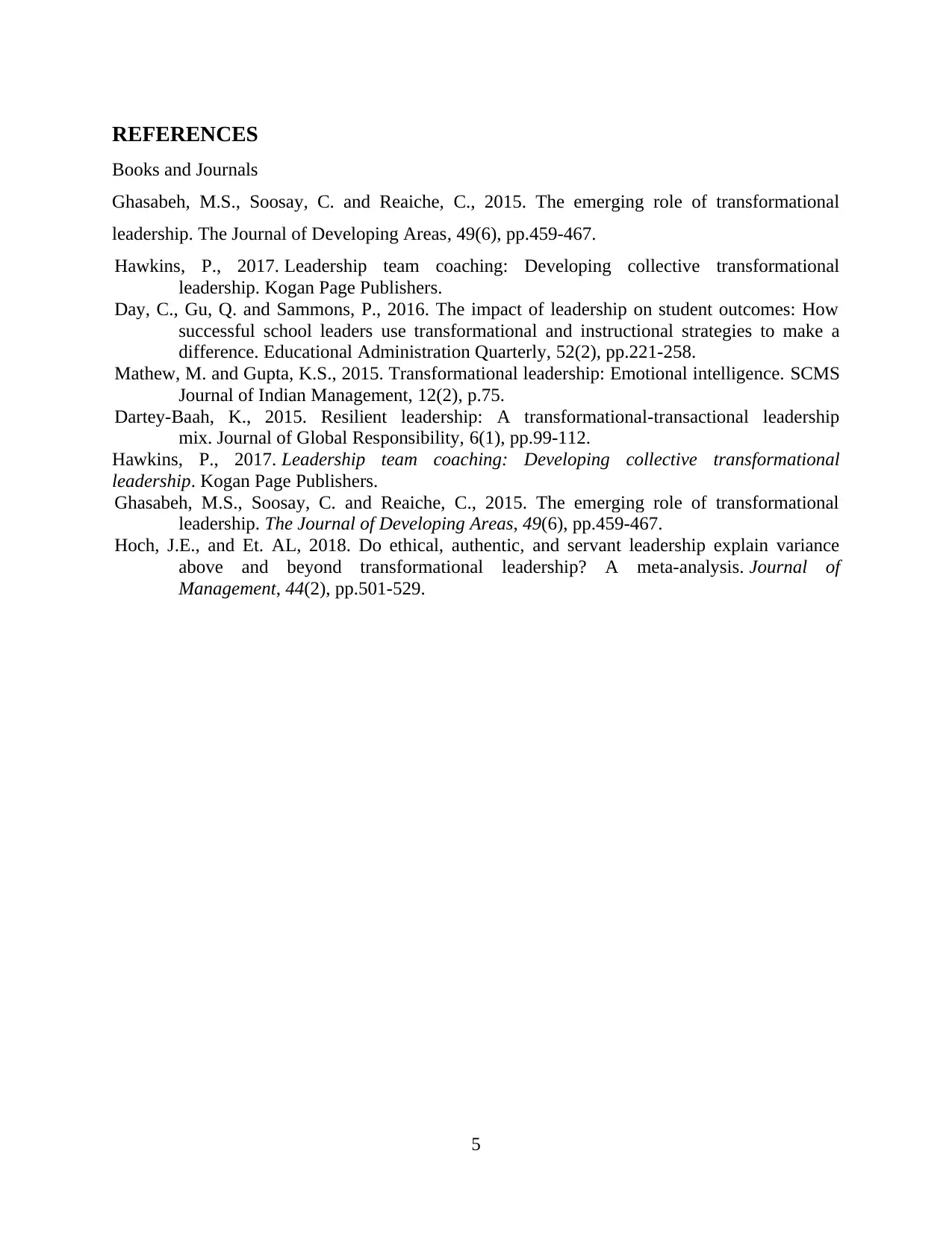
REFERENCES
Books and Journals
Ghasabeh, M.S., Soosay, C. and Reaiche, C., 2015. The emerging role of transformational
leadership. The Journal of Developing Areas, 49(6), pp.459-467.
Hawkins, P., 2017. Leadership team coaching: Developing collective transformational
leadership. Kogan Page Publishers.
Day, C., Gu, Q. and Sammons, P., 2016. The impact of leadership on student outcomes: How
successful school leaders use transformational and instructional strategies to make a
difference. Educational Administration Quarterly, 52(2), pp.221-258.
Mathew, M. and Gupta, K.S., 2015. Transformational leadership: Emotional intelligence. SCMS
Journal of Indian Management, 12(2), p.75.
Dartey-Baah, K., 2015. Resilient leadership: A transformational-transactional leadership
mix. Journal of Global Responsibility, 6(1), pp.99-112.
Hawkins, P., 2017. Leadership team coaching: Developing collective transformational
leadership. Kogan Page Publishers.
Ghasabeh, M.S., Soosay, C. and Reaiche, C., 2015. The emerging role of transformational
leadership. The Journal of Developing Areas, 49(6), pp.459-467.
Hoch, J.E., and Et. AL, 2018. Do ethical, authentic, and servant leadership explain variance
above and beyond transformational leadership? A meta-analysis. Journal of
Management, 44(2), pp.501-529.
5
Books and Journals
Ghasabeh, M.S., Soosay, C. and Reaiche, C., 2015. The emerging role of transformational
leadership. The Journal of Developing Areas, 49(6), pp.459-467.
Hawkins, P., 2017. Leadership team coaching: Developing collective transformational
leadership. Kogan Page Publishers.
Day, C., Gu, Q. and Sammons, P., 2016. The impact of leadership on student outcomes: How
successful school leaders use transformational and instructional strategies to make a
difference. Educational Administration Quarterly, 52(2), pp.221-258.
Mathew, M. and Gupta, K.S., 2015. Transformational leadership: Emotional intelligence. SCMS
Journal of Indian Management, 12(2), p.75.
Dartey-Baah, K., 2015. Resilient leadership: A transformational-transactional leadership
mix. Journal of Global Responsibility, 6(1), pp.99-112.
Hawkins, P., 2017. Leadership team coaching: Developing collective transformational
leadership. Kogan Page Publishers.
Ghasabeh, M.S., Soosay, C. and Reaiche, C., 2015. The emerging role of transformational
leadership. The Journal of Developing Areas, 49(6), pp.459-467.
Hoch, J.E., and Et. AL, 2018. Do ethical, authentic, and servant leadership explain variance
above and beyond transformational leadership? A meta-analysis. Journal of
Management, 44(2), pp.501-529.
5
1 out of 7
Related Documents
Your All-in-One AI-Powered Toolkit for Academic Success.
+13062052269
info@desklib.com
Available 24*7 on WhatsApp / Email
![[object Object]](/_next/static/media/star-bottom.7253800d.svg)
Unlock your academic potential
Copyright © 2020–2026 A2Z Services. All Rights Reserved. Developed and managed by ZUCOL.





